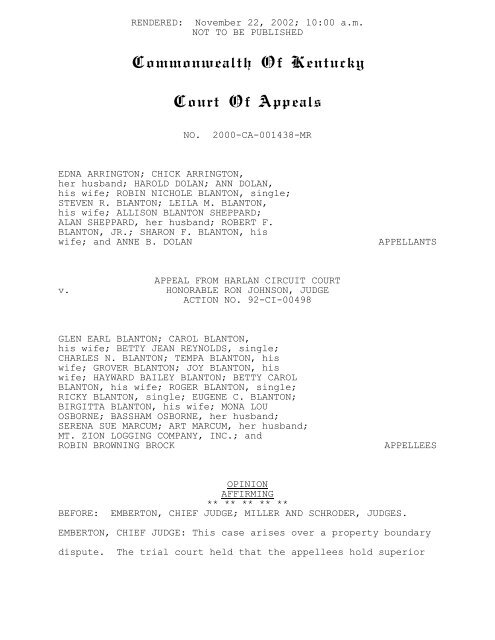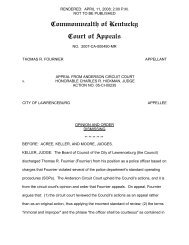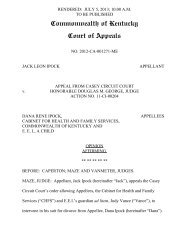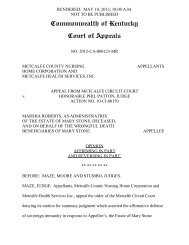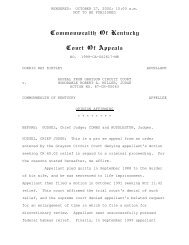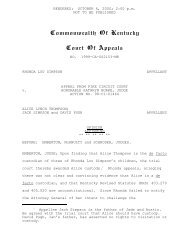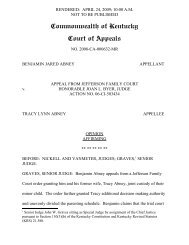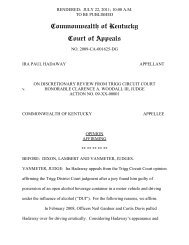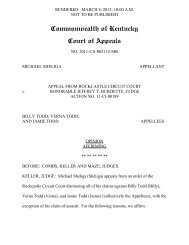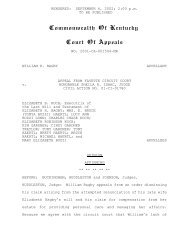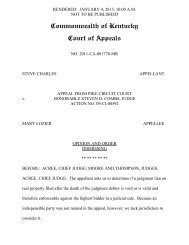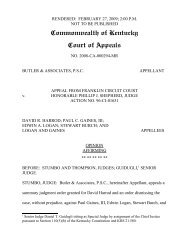2000-CA-001438 (PDF) - Kentucky Supreme Court Searchable ...
2000-CA-001438 (PDF) - Kentucky Supreme Court Searchable ...
2000-CA-001438 (PDF) - Kentucky Supreme Court Searchable ...
Create successful ePaper yourself
Turn your PDF publications into a flip-book with our unique Google optimized e-Paper software.
RENDERED: November 22, 2002; 10:00 a.m.<br />
NOT TO BE PUBLISHED<br />
C ommonwealth Of K entucky<br />
<strong>Court</strong> Of A ppeals<br />
NO. <strong>2000</strong>-<strong>CA</strong>-<strong>001438</strong>-MR<br />
EDNA ARRINGTON; CHICK ARRINGTON,<br />
her husband; HAROLD DOLAN; ANN DOLAN,<br />
his wife; ROBIN NICHOLE BLANTON, single;<br />
STEVEN R. BLANTON; LEILA M. BLANTON,<br />
his wife; ALLISON BLANTON SHEPPARD;<br />
ALAN SHEPPARD, her husband; ROBERT F.<br />
BLANTON, JR.; SHARON F. BLANTON, his<br />
wife; and ANNE B. DOLAN APPELLANTS<br />
APPEAL FROM HARLAN CIRCUIT COURT<br />
v. HONORABLE RON JOHNSON, JUDGE<br />
ACTION NO. 92-CI-00498<br />
GLEN EARL BLANTON; <strong>CA</strong>ROL BLANTON,<br />
his wife; BETTY JEAN REYNOLDS, single;<br />
CHARLES N. BLANTON; TEMPA BLANTON, his<br />
wife; GROVER BLANTON; JOY BLANTON, his<br />
wife; HAYWARD BAILEY BLANTON; BETTY <strong>CA</strong>ROL<br />
BLANTON, his wife; ROGER BLANTON, single;<br />
RICKY BLANTON, single; EUGENE C. BLANTON;<br />
BIRGITTA BLANTON, his wife; MONA LOU<br />
OSBORNE; BASSHAM OSBORNE, her husband;<br />
SERENA SUE MARCUM; ART MARCUM, her husband;<br />
MT. ZION LOGGING COMPANY, INC.; and<br />
ROBIN BROWNING BROCK APPELLEES<br />
OPINION<br />
AFFIRMING<br />
** ** ** ** **<br />
BEFORE: EMBERTON, CHIEF JUDGE; MILLER AND SCHRODER, JUDGES.<br />
EMBERTON, CHIEF JUDGE: This case arises over a property boundary<br />
dispute. The trial court held that the appellees hold superior
title to the property and awarded damages against the appellants.<br />
We affirm.<br />
Most of the principal parties to this action share a<br />
familial relationship. The controversy arises from two separate<br />
deeds. The appellants are heirs of Norma Blanton Dolan and her<br />
brother, Robert F. Blanton, children of Grover and Oxie Blanton.<br />
In 1939, Grover and Oxie Blanton, through a deed referred to as<br />
the Boyd Dickinson patent, acquired approximately 6,000 acres on<br />
the south side of Pine Mountain in Harlan County. Both died<br />
testate, Grover in 1960 and Oxie in 1966, leaving their estate to<br />
four sets of their living children. The heirs of Jesse M.<br />
Blanton, the deceased son of Grover and Oxie, were left none of<br />
the Pine Mountain property. The appellees are the heirs of Jesse<br />
Blanton, and their spouses, who claim title to 200 acres of land<br />
referred to as the John L. Blanton patent on Pine Mountain,<br />
acquired through a deed of conveyance in 1943 from Sylvania<br />
Blanton Dawn to Jesse. 1<br />
In 1992, the appellees filed this action against Mt.<br />
Zion Logging which removed timber from the property to which<br />
appellees claim title and against appellants who contracted with<br />
Mt. Zion. Following some procedural wrangling insignificant to<br />
the present appeal, a bench trial was held and a judgment was<br />
entered finding appellees to have superior title and awarding<br />
damages in the amount of $6,700. An attorney’s fee was later<br />
awarded.<br />
1<br />
The remaining heirs declined to participate as plaintiffs<br />
and were named as defendants.<br />
-2
2<br />
The appellants claim superior title based on Grover and<br />
Oxie’s title which goes back to the Boyd Dickinson patent of 1845<br />
which encompasses the John L. Blanton patent. Generally, a<br />
senior patent prevails over a junior patent. As stated in Givens<br />
v. U.S. Trust Co.: 2<br />
[I]t is sufficient to say that it has been<br />
repeatedly held by this court that vacant and<br />
unappropriated land under the statute in<br />
force from 1868 to 1871, the time the land in<br />
controversy herein was surveyed, when once<br />
appropriated by an entry, survey, or patent,<br />
is not thereafter subject to another<br />
appropriation and a junior entry, survey, or<br />
patent is absolutely void to the extent it<br />
covers or embraces the land previously<br />
entered, surveyed, or patented.<br />
Thus, assuming the appellants are correct in their<br />
contention that the Boyd Dickinson patent encompasses the John L.<br />
Blanton patent, they have superior title. However, we believe<br />
the trial court correctly ruled that the appellants are estopped<br />
from raising their claim to superior title.<br />
In November 1939, Sylvania Blanton’s husband, Matt<br />
Blanton, died intestate without children. Sylvania filed a<br />
partition action alleging that Matt died the owner of, and in<br />
possession of, certain real property including a one-fifth<br />
interest in the 200 acre patent in the name of John L. Blanton,<br />
which is the subject of the present action. Grover and Oxie were<br />
named as parties to the partition action. It would be pure<br />
speculation to consider why Grover and Oxie did not assert<br />
superior title to the John L. Blanton patent. Likewise it would<br />
be conjecture to find significance in the fact that on the same<br />
251 Ky. 587, 65 S.W.2d 682, 683 (1933).<br />
-3-
date Sylvania conveyed the John L. Blanton patent to Jesse M.<br />
Blanton, she conveyed to Jesse’s father, Grover Blanton, the<br />
Joseph Blanton patent. It remains that Grover and Oxie were<br />
named as parties to the action partitioning the property now in<br />
dispute, and which was ultimately deeded by the commissioner to<br />
Sylvania. The doctrine of res judicata is explained as follows:<br />
The general rule for determining the<br />
question of res adjudicata as between parties<br />
in actions embraces several conditions.<br />
First, there must be identity of parties.<br />
Second, there must be identity of the two<br />
causes of action. Third, the action must be<br />
decided upon its merits. In short, the rule<br />
of res adjudicata does not act as a bar if<br />
there are different issues or the questions<br />
of law presented are different. Likewise, it<br />
has long been recognized that a party may not<br />
split his cause of action, therefore, if a<br />
cause of action should have been presented<br />
and the party failed to do so and the matter<br />
should again arise in another action, it will<br />
be held that the first action was res<br />
adjudicata as to all causes that should have<br />
properly been presented. We stated the rule<br />
in Hays v. Sturgill, 302 Ky. 31, 193 S.W.2d<br />
648, 164 A.L.R. 868, as follows:<br />
The rule that issues which have<br />
been once litigated cannot be subject<br />
matter of later action is not only<br />
salutary but necessary in the<br />
administration of justice. The<br />
subsidiary rule that one may not split<br />
up his cause of action and have it tried<br />
piecemeal rests upon the same<br />
foundation. To permit it would not be<br />
just to the adverse party or fair to the<br />
courts. So, as said in Combs v.<br />
Prestonsburg Water Co., 260 Ky. 169, 84<br />
S.W.2d 15, 18: “The rule is elementary<br />
that, when a matter is in litigation,<br />
parties are required to bring froward<br />
their whole case; and “the plea of res<br />
judicata applies not only to the points<br />
upon which the court was required by the<br />
parties to form an opinion and pronounce<br />
judgment, but to every point which<br />
properly belonged to the subject of<br />
-4
3<br />
Newman v. Newman, Ky., 451 S.W.2d 417, 419 (1970).<br />
4<br />
Morgan v. Big Woods Lumber Company, 198 Ky. 88, 249 S.W.<br />
329, 335 (1923).<br />
5<br />
litigation, and which the parties,<br />
exercising reasonable diligence, might<br />
have brought forward at the time.”“ 3<br />
(Emphasis original).<br />
A partition action and resulting judgment has the same<br />
force and effect as any other judgment of a court. The judgment<br />
cannot be collaterally attacked, at least by those parties to the<br />
action, by alleging some error or that the question should have<br />
been otherwise decided.<br />
Those of the joint owners who procure that<br />
partition and to who consent and agree to<br />
have their respective interest in the land<br />
allotted to them, respectively, in<br />
severality, cannot complain, and certainly no<br />
stranger would have any cause of complaint,<br />
and while there may found abundant authority<br />
which holds the proceedings is invalid as to<br />
a party in interest who was not made a party<br />
to the proceeding no authority has been<br />
pointed out which maintains a doctrine to the<br />
effect that the proceeding is not valid as to<br />
all those participating in it. 4<br />
Finally, we do not find the trial court’s holding that<br />
neither party established ownership by adverse possession to be<br />
clearly erroneous. To establish title by adverse possession, the<br />
assertion of ownership must have been open, hostile, actual and<br />
exclusive, and continuous for a period of at least fifteen years.<br />
As explained in <strong>Kentucky</strong> Women’s Christian Temperance Union v.<br />
Thomas: 5<br />
Notoriety, exclusiveness and continuity<br />
of possession are often evidenced by the<br />
erection of physical improvements on the<br />
Ky., 412 S.W.2d 869, 870 (1967).<br />
-5
property, such as fences, houses or other<br />
structures. We have none of those here. In<br />
their absence, substantial activity on the<br />
land is required. As said in Combs v. Ezell,<br />
232 Ky. 602, 24 S.W.2d 301, 305:<br />
Adverse possession of land may be said<br />
to be founded in trespass; it must be a<br />
trespass constantly continued by acts on<br />
the premises. It must challenge the<br />
right of all the world; the claimant<br />
must keep his flag flying, and present a<br />
hostile front to all adverse<br />
pretentions.<br />
The use of the property in question by anyone,<br />
including the appellants, was, at best, sporadic. The property<br />
consists of woodland suitable primarily for hunting and<br />
recreational purposes. Other than an old road, the use of which<br />
by both parties has been infrequent, there are no improvements to<br />
the property. There was no error.<br />
The award of attorney’s fees is affirmed.<br />
The judgment is affirmed.<br />
ALL CONCUR.<br />
BRIEF FOR APPELLANTS:<br />
Glenn L. Green, Jr.<br />
Harlan, <strong>Kentucky</strong><br />
Donald Duff<br />
Frankfort, <strong>Kentucky</strong><br />
-6-<br />
BRIEF FOR APPELLEES:<br />
W. Henry Lawson<br />
LAWSON AND LAWSON, P.S.C.<br />
Pineville, <strong>Kentucky</strong>


